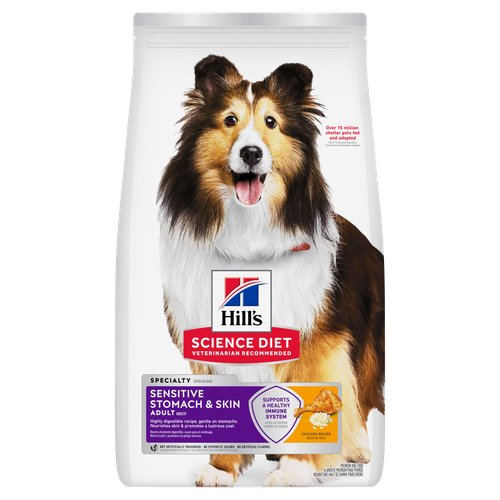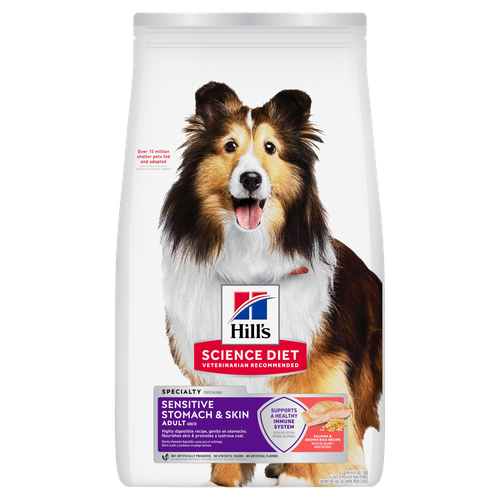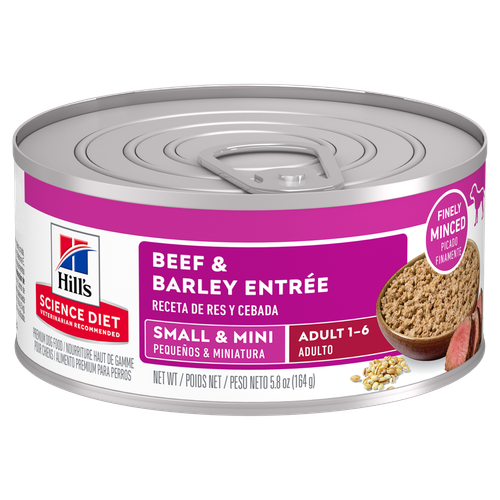
-
Find the right food for your petTake this quiz to see which food may be the best for your furry friend.Find the right food for your petTake this quiz to see which food may be the best for your furry friend.Featured products
 Adult Chicken & Barley Recipe Dog Food
Adult Chicken & Barley Recipe Dog FoodSupports lean muscle and beautiful coat for adult dogs
Shop Now Hill's Science Diet Adult Chicken & Beef Entrée Dog Food
Hill's Science Diet Adult Chicken & Beef Entrée Dog FoodChicken & Beef Entrée in a delicious loaf with complete & balanced nutrition to help keep adult dogs active and healthy
Shop Now Adult Large Breed Chicken & Barley Recipe Dog Food
Adult Large Breed Chicken & Barley Recipe Dog FoodSupports healthy joints, lean muscle, and beautiful coat for large breed dogs
Shop NowFeatured products Kitten Sensitive Stomach & Skin Salmon & Vegetable Stew
Kitten Sensitive Stomach & Skin Salmon & Vegetable StewSupports kitten growth, digestive health, nourishes skin and promotes a lustrous fur
Shop Now Adult Perfect Weight Vegetable & Turkey Medley Cat Food
Adult Perfect Weight Vegetable & Turkey Medley Cat FoodOver 70% of cats lost weight within 10 weeks when fed this nutrition
Shop Now Adult Urinary Hairball Control
Adult Urinary Hairball ControlSupports the health of the whole urinary system with optimal levels of magnesium
Shop Now -
Dog
- Dog Tips & Articles
-
Health Category
- Weight
- Food & Environmental Sensitivities
- Urinary
- Digestive
- Joint
- Kidney
-
Life Stage
- Puppy Nutrition
- Adult Nutrition
- Senior Nutrition
Cat- Cat Tips & Articles
-
Health Category
- Weight
- Skin & Food Sensitivities
- Urinary
- Digestive
- Kidney
-
Life Stage
- Kitten Nutrition
- Adult Nutrition
Featured articles What Is Littermate Syndrome? Pet Adoption Guide
What Is Littermate Syndrome? Pet Adoption GuideLearn more about littermate syndrome in dogs and cats and how to successfully navigate adoption and early socialization processes.
Read More How to Properly Mix Wet & Dry Pet Foods
How to Properly Mix Wet & Dry Pet FoodsAn Orange cat eating from a bowl filled with mixed food
Read More The Science Behind Our Love for Pets
The Science Behind Our Love for PetsLearn the scientific reasons why we have such strong connections with our pets, and what science says about the love between humans and our furry friends.
Read More -


MATURE ADULT DOG CARE

As in humans, a dog's body and daily activity levels change with age. By altering the way you care for your older dog, you can maintain his optimum health into his golden years.
Dogs are often considered older when they reach half of their life expectancy. A food change should be considered around the age of five years for large-and giant –breed dogs and around seven years for small and medium dogs.


Tasty Tips
At this more mature age, dogs may gradually start to gain weight and develop age related physical and behavioral changes. Older dogs also have a greater risk of developing problems with their kidneys and heart. They may have special digestive needs, so a food with lower fat, phosphorus, protein and calories and with increased amounts of fiber is ideal.
Learn more about Hill's® Science Diet® Mature Adult 7+ dog food.
Related products

Science-backed nutrition tailored for skin and digestive health, packed with clinically proven, immune system supporting antioxidants.

Science-backed nutrition tailored for skin and digestive health, packed with clinically proven, immune system supporting antioxidants.

Chicken & Barley recipe and Beef & Barley recipe with precisely balanced nutrition to keep adult dogs active and healthy.

Science-backed nutrition tailored for skin and digestive health, packed with clinically proven, immune system supporting antioxidants.
Related articles

Wondering where can I buy a dog? Consider adoption and explore the pros and cons of adopting a dog from a breeder versus an animal shelter.

Discover how the field of dog science is giving us more and more insights into the inner workings of our furry best friends.

Your dog's coat and skin are a big part of your dog's overall health. Ensure you keep your dog's coat healthy, by following these simple tips.

Learn how to help keep your dog's immune system in tip-top shape, including nutritional immune system support for dogs and other strategies.

Put your dog on a diet without them knowing
Our low calorie formula helps you control your dog's weight. It's packed with high-quality protein for building lean muscles, and made with purposeful ingredients for a flavorful, nutritious meal. Clinically proven antioxidants, Vitamin C+E, help promote a healthy immune system.
Put your dog on a diet without them knowing
Our low calorie formula helps you control your dog's weight. It's packed with high-quality protein for building lean muscles, and made with purposeful ingredients for a flavorful, nutritious meal. Clinically proven antioxidants, Vitamin C+E, help promote a healthy immune system.


